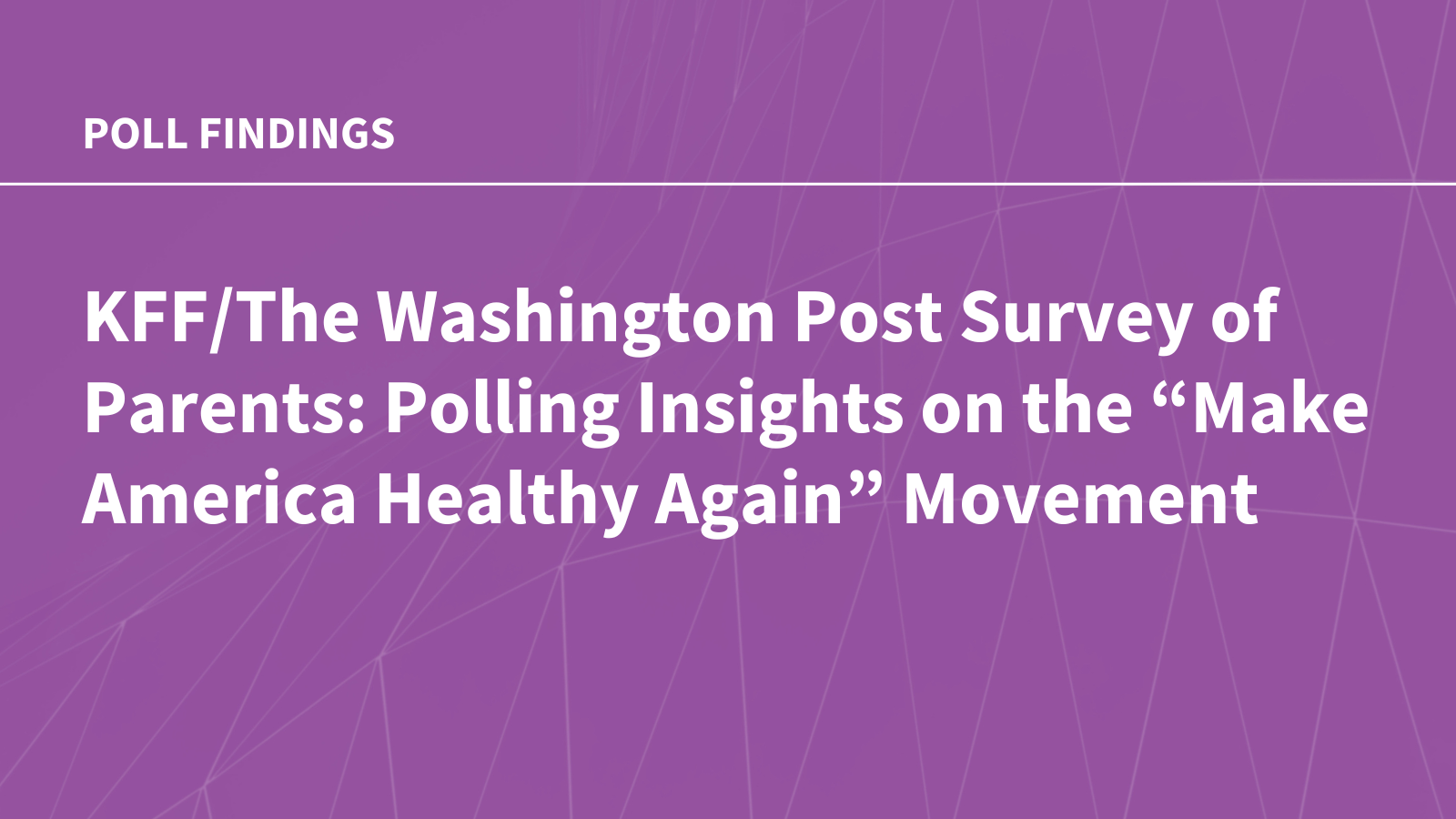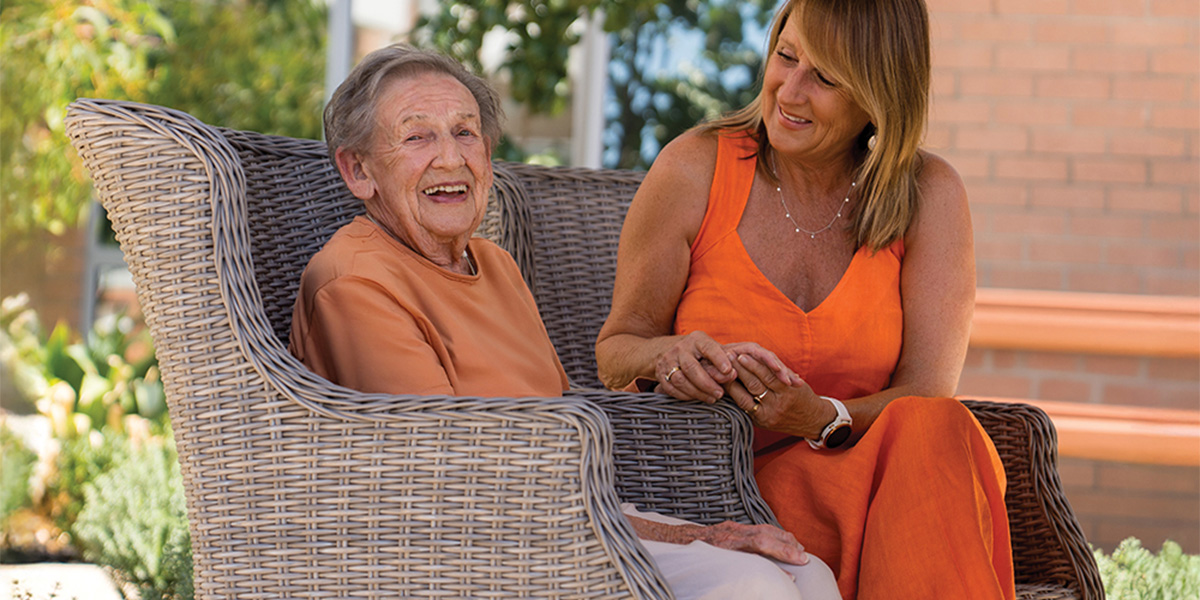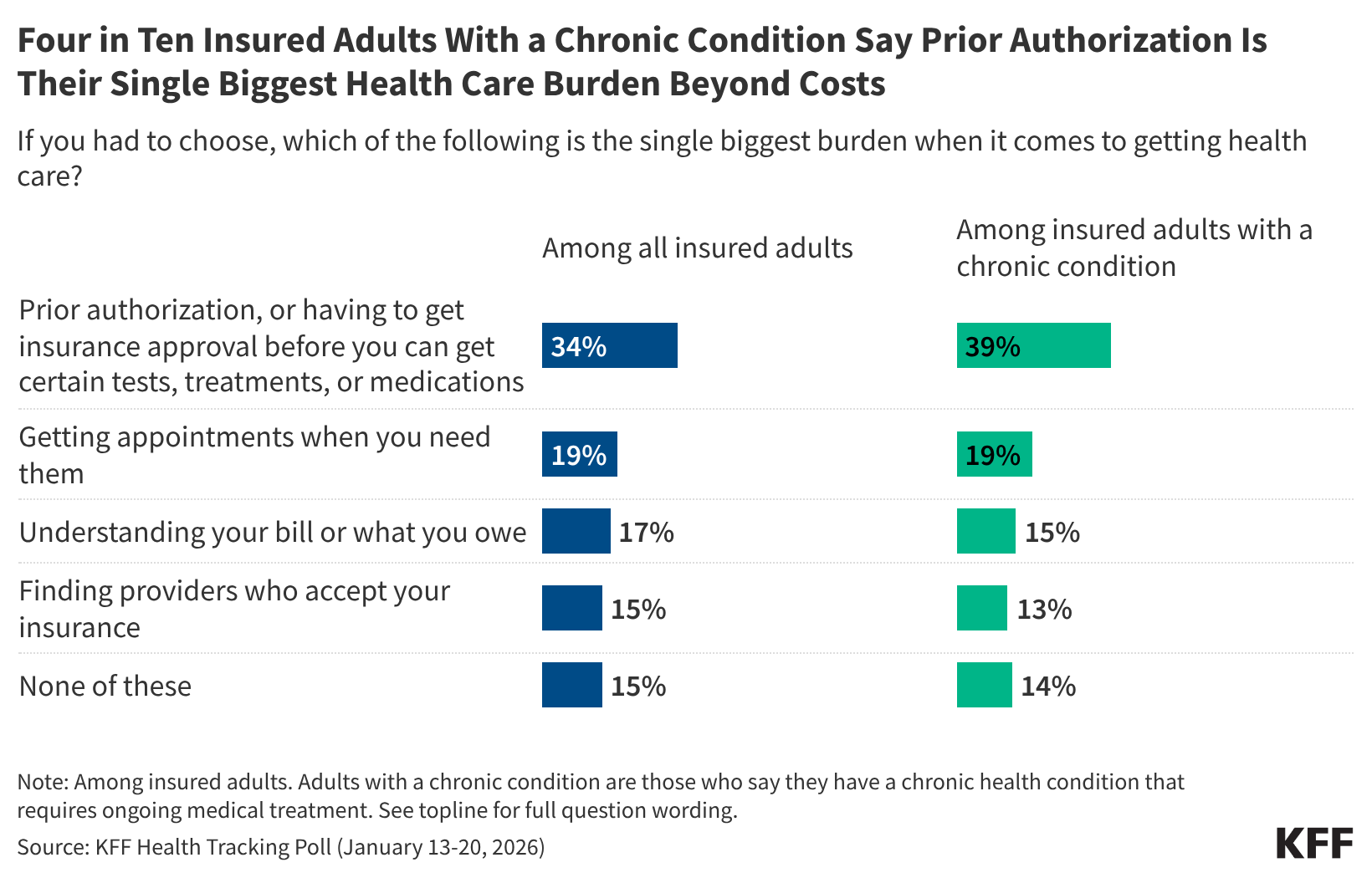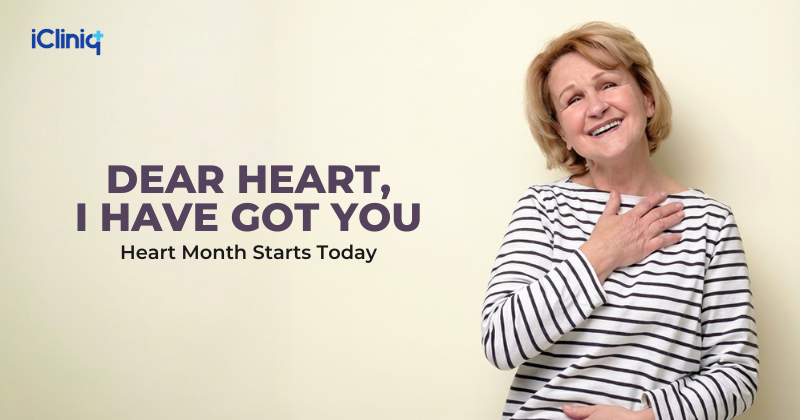At the start of his second term, President Donald Trump established the Make America Healthy Again (MAHA) Commission, chaired by Health and Human Services Secretary Robert F. Kennedy Jr., to examine the rise in chronic childhood conditions and develop federal strategies to address them. Recent MAHA Commission reports have covered issues including diet and exercise, the dangers of social media and excessive screen time, the impact of highly-processed foods, and use of prescription medications and vaccines. Findings from the KFF/Washington Post Survey of Parents shed light on the issues that parents see as top concerns for their children’s wellbeing and the attitudes and behaviors of parents who identify with the MAHA movement.
Key Takeaways
- About four in ten (38%) parents identify as supporters of the MAHA movement, a coalition that includes between three in ten and four in ten parents across gender, age, race, and ethnicity. Alignment with the movement among parents is highly correlated with political identification, as about six in ten Republican parents (62%), rising to eight in ten MAGA Republican parents (81%), identify with the President’s health movement, compared to about one in six (17%) Democratic parents. One third of independent parents (34%) identify with the movement.
- Many MAHA-supporting parents echo vaccine skepticism that has been amplified by HHS Secretary Kennedy. Nearly six in ten (56%) MAHA parents say they trust Kennedy to provide reliable information about vaccines, more than twice the share of non-MAHA-supporting parents who say the same (23%). While few MAHA parents say they are “anti-vaccine” (9%), a majority say they are “in the middle” when it comes to vaccines (55%), and their attitudes reflect this mix of views and behaviors. Most MAHA parents say they have kept their children up to date with recommended vaccines (75%), but at least four in ten say the CDC recommends too many vaccines for children (42%) and they are not confident in U.S. health agencies to ensure vaccine safety and effectiveness (58%).
- There is broad agreement across parents on some of the biggest issues facing children’s health in the U.S. today, with large shares of both MAHA-supporting parents and non-MAHA parents saying the use of social media (78% and 74% respectively) and mental health challenges (68% and 69%) are either the biggest or a major threat to children’s health. Majorities of both groups also cite highly processed foods (78% and 62%) and obesity (69% and 61%) as major threats to children’s health, though the shares are somewhat larger for MAHA parents compared to non-MAHA parents. Attitudes diverge on some other issues, with larger shares of MAHA parents than non-MAHA parents citing over-prescribing of medications (61% vs. 43%), neurodevelopmental disorders (48% vs. 38%), and fluoride in water supplies (33% vs. 25%) as at least major threats to children’s health. Parents who do not support the MAHA movement are more likely than MAHA parents to cite gun violence (68% among non-MAHA parents vs. 50% among MAHA parents), pollution (56% vs. 48%), difficulty affording enough food (50% vs. 41%), and infectious diseases (45% vs. 36%) as the biggest or major threats to children’s health in the U.S. today.
- The MAHA Commission’s policy goals related to regulating food in the U.S. have broad support, though parents are split on the question of whether to deregulate the sale of raw milk. At least eight in ten parents support increasing government regulations on dyes and chemical additives in food (85%), on highly processed food (82%), and on added sugars in food (80%). While MAHA-supporting parents are more likely than non-MAHA parents to support each of these regulation proposals, at least three in four, regardless of MAHA support, support these policy goals. About half (47%) of parents support deregulating the sale of unpasteurized milk, including much larger shares of MAHA (63%) than non-MAHA (36%) supporting parents.
Who Are MAHA Parents?
About four in ten (38%) parents say they are supporters of the MAHA movement, with support strongly tied to political identification. About six in ten (62%) Republican parents identify with the movement, rising to eight in ten (81%) among Republicans who support the Make America Great Again (MAGA) movement. About one-third (34%) of independent parents and one in six (17%) Democratic parents support the MAHA movement.
Larger shares of parents without a college degree (41%) than with a college degree (33%) support the MAHA movement, a difference that persists even when controlling for partisanship, MAGA identity, and other demographics.
About four in ten White parents (43%) say they support the MAHA movement compared to about three in ten Hispanic parents (32%) and Black parents (30%). While much media attention has been paid to so-called MAHA moms, a group of social media influencers who amplify the MAHA movement’s stance on food additives, this poll finds similar shares of mothers and fathers say they support MAHA, as do similar shares of parents across age groups.
Trusted Information Sources for MAHA Parents
There are wide divisions when it comes to trust in some sources of vaccine information for MAHA and non-MAHA parents. Pediatricians continue to be the most trusted source of information about vaccines for parents, with about eight in ten (81%) MAHA-supporting parents and about nine in ten (88%) non-MAHA parents saying they trust their child’s pediatrician “a great deal” or “a fair amount.”
Aside from pediatricians, majorities of MAHA parents say they trust their friends and family (58%), HHS Secretary Kennedy (56%), and their local public health departments (56%) for vaccine information, making these the top sources of vaccine information for these parents after pediatricians. About half of MAHA parents report trusting the CDC (51%) or FDA (47%) for information on vaccines. One-third or fewer MAHA parents say they trust their child’s school or daycare (37%), pharmaceutical companies (22%), or health and wellness influencers (14%) “a great deal” or “a fair amount” when it comes to reliable information about vaccines.
Vaccine Views Among MAHA-Supporting Parents
In a section titled “The Overmedicalization of Our Kids,” the White House’s MAHA report released earlier this year states that while vaccines protect children from infectious diseases, there has not been enough research into the risks of vaccines. Vaccine skepticism is a core component of the MAHA platform.
As with parents overall, MAHA and non-MAHA parents overwhelmingly value long-standing childhood vaccines but are more divided when it comes to the COVID-19 and flu vaccines for children. About nine in ten MAHA and non-MAHA parents see the measles, mumps, and rubella (MMR) (86% and 93% respectively) and polio (85% and 91%) vaccines as important for children in their communities, including majorities who say each of these are “very important.”
MAHA parents, however, are much less likely to say the COVID-19 or flu vaccines are important for children in their communities. Parents who do not support the MAHA movement are nearly twice as likely as MAHA parents to say it is “very” or “somewhat” important for children in their community to be vaccinated for COVID-19 (52% vs. 28%) and 20 percentage points more likely to say it is important for children to be vaccinated for the flu (64% vs. 44%).
While most MAHA and non-MAHA parents report confidence in the safety of MMR and polio vaccines, MAHA parents are less likely to be “very” confident. These parents are even less confident in the safety of flu and COVID-19 vaccines for children. About three in four MAHA parents (78%) and nearly nine in ten non-MAHA-supporting parents (88%) are confident in the safety of MMR vaccines, though MAHA parents are less likely than non-MAHA parents to be “very confident” (44% vs. 60%). Similarly, about eight in ten (79%) MAHA parents and nine in ten (88%) non-MAHA parents are confident in the safety of polio vaccines, with fewer MAHA parents being “very confident” (43% vs. 60%).
When it comes to the safety of COVID-19 vaccines for children, just one in four MAHA-supporting parents are “very” (9%) or “somewhat” (16%) confident, compared to about half (54%) of non-MAHA parents. In fact, about half (53%) of MAHA parents say they are “not at all” confident in the safety of COVID-19 vaccines for children. MAHA parents are divided in their confidence in the flu vaccines for children, with about half (54%) saying they are confident. About seven in ten (72%) parents who do not support the MAHA movement are confident in the safety of the flu vaccines.
Parents who support the MAHA movement are more likely than parents who do not support MAHA to hold vaccine skeptical views explored in this survey, though few (9%) would call themselves anti-vaccine. About six in ten (58%) MAHA parents say they are not confident in the CDC and FDA to ensure the safety and effectiveness of vaccines approved for use in the U.S., compared to about half (47%) of non-MAHA parents.
About half (51%) of MAHA-supporting parents say children are healthier when their vaccines are spaced out and they do not get multiple shots in one visit, while about half (47%) correctly say there is no strong evidence for this. Parents who are not supporters of the MAHA movement are more likely to correctly indicate that there is no evidence for spacing vaccines (63%), while one-third (35%) say children are healthier when vaccines are spaced out.
About four in ten MAHA-supporting parents (42%) say the CDC recommends “too many” childhood vaccines, more than twice the share of non-MAHA parents who say the same (17%).
As with parents overall, a majority of MAHA-supporting parents report keeping their children up to date on childhood vaccinations aside from COVID-19 and flu (75%). However, one in four MAHA-supporting parents (24%) report skipping or delaying at least one childhood vaccine for their kids, more than twice the share of non-MAHA-supporting parents who report the same (11%).
Make America Healthy Again and Vaccine Myths
HHS Secretary Kennedy has amplified claims about vaccines that have been rejected by scientists and public health officials, adding to the confusion surrounding their safety. While small shares of parents believe these claims are true, most MAHA parents do not reject them as false, and many express uncertainty.
Though the overall shares are small, MAHA parents are more likely than non-MAHA parents to say it is true that chronic diseases are likely rising because of an increase in the number of vaccines children get (21% vs. 8%), that MMR vaccines can cause autism in children (15% vs. 6%), that the measles vaccine causes the same illness it is supposed to prevent (11% vs. 6%), and that vitamin A is an effective treatment for measles (9% vs. 4%).
About half of MAHA parents say they “do not know enough to say” whether it is true that the measles vaccine causes the illness it is meant to prevent, or that chronic diseases are likely rising because of an increase in the number of vaccines children get, two claims alluded to in the MAHA Commission report. Fewer than four in ten MAHA parents correctly say either of these claims are false (38% and 31% respectively), while a majority of non-MAHA parents identify these as false (57% and 55%).
When it comes to the false claim that MMR vaccines can cause autism in children, nearly six in ten (59%) MAHA parents say they “do not know enough to say” whether it is true, and about one in four (26%) say it is false. Non-MAHA-supporting parents are about twice as likely to correctly indicate that this claim is false (53%). There has been extensive scientific research disproving the link between autism and vaccines.
Views of Autism Research
While there has been extensive scientific research disproving the link between autism and vaccines, there is a lack of consensus on the exact causes for the rise in autism rates in the U.S. The White House MAHA Commission is tasked with studying the root causes of autism.
Many (44%) parents overall say there has been “too little” research into the causes of autism spectrum disorder generally. One in four parents say there has been “about the right amount” of research, and a similar share (28%) say they are not sure. Few (3%) parents say there has been too much research into the topic.
When asked more specifically about the amount of research done into whether there is a link between vaccines and autism spectrum disorder, one-third say there has been “too little” research into this, and similar shares say there has been “about the right amount” (29%) or they are not sure (30%). Few (7%) parents say there has been “too much” research into whether there is a link.
Parents who support the MAHA movement, and Republican parents (including MAGA Republican parents) are more likely than their counterparts to say there has been “too little” research into the causes of autism or whether there is a link between autism and vaccines. In fact, MAHA-supporting parents are twice as likely as non-MAHA parents to say there has been too little research into the connection between autism and vaccines (48% vs. 24%).
While about six in ten parents of children diagnosed with autism spectrum disorder say there has been “too little” research into the causes of autism spectrum disorder generally (61%), fewer – about one-third (35%) – say there has been too little research into whether there is a link between vaccines and autism spectrum disorder. About six in ten parents who have skipped or delayed vaccines for their children say there has been too little research into the causes of ASD (60%) or whether there is a link between vaccines and ASD (57%).
What Do Parents See As the Biggest Threats to Children’s Health in the U.S.?
Social media use, mental health challenges, and issues related to diet and exercise are top issues parents view as serious threats to children’s health in the U.S. At least six in ten parents overall say social media use (75%), highly processed foods (68%), mental health challenges such as chronic anxiety or depression (68%), obesity (64%), gun violence (61%), and lack of physical activity (60%) are either the “biggest” or a “major” threat to children’s health in the U.S. today. About half of parents say pollution, poor air quality, and environmental toxins (53%), over-prescribing medications (50%), and difficulty affording food (46%) are at least major threats to children’s health, while about four in ten cite neurodevelopmental disorders (42%) and infectious diseases (41%) as threats. Fewer (28%) see fluoride in local water supplies as the biggest or a major threat to children’s health.
Despite partisan and demographic differences in who identifies with the MAHA movement, there are some similarities in what parents see as the biggest threats to children’s health. Social media and mental health challenges rank high for both MAHA and non-MAHA-supporting parents when it comes to assessing threats to children’s health, with about three-fourths of MAHA-supporting parents (78%) and non-MAHA-supporting parents (74%) citing social media, and about seven in ten of each group citing mental health challenges.
For issues related to nutrition and exercise, majorities of parents in both groups identify these as threats to children’s health, but MAHA parents are more likely to emphasize their level of threat. MAHA parents are more likely than parents who do not support the movement to say highly processed foods (78% among MAHA parents vs. 62% among non-MAHA parents), obesity (69% vs. 61%), and lack of physical activity (66% vs. 57%) are threats to children’s health. MAHA parents are also more likely to cite over-prescribing medications (61% vs. 43%), neurodevelopmental disorders (48% vs. 38%), and fluoride in water supplies (33% vs. 25%) as the biggest or major threats to children’s health today.
Parents who do not support the MAHA movement, largely comprised of Democratic and independent parents, are more likely to cite gun violence (68% among non-MAHA parents vs. 50% among MAHA parents), pollution (56% vs. 48%), difficulty affording enough food (50% vs. 41%), and infectious diseases (45% vs. 36%) as the biggest or major threats to children’s health in the U.S. today.
Support for Regulating Food Additives
In the past year, Robert F. Kennedy Jr. has called for stricter regulations on the U.S. food supply, requesting the removal of synthetic dyes and ultra-processed foods, citing their negative impact on children’s health. These policy proposals are popular, with at least eight in ten parents saying they “strongly” or “somewhat” support increasing government regulations on dyes and chemical additives in food (85%), on highly processed food (82%), and on added sugars in food (80%). About one in five or fewer parents oppose each of these proposals.
Parents are more divided when it comes to removing government restrictions on the sale of unpasteurized or raw milk, with half (47%) in support and another half (52%) opposed.
About three quarters or more of Democratic parents, independent parents, Republican parents, MAHA-supporting, and non-MAHA-supporting parents support increasing government regulation on food additives, highly processed foods, and sugar. Partisans are divided on the question of raw milk de-regulation, as six in ten Republican (60%) and MAHA-supporting (63%) parents support removal of restrictions on raw milk, while majorities of non-MAHA supporters and Democrats are in opposition. For decades, the FDA has prohibited the interstate sale of raw milk, citing serious health risks posed by the consumption of unpasteurized milk. While Secretary Kennedy has previously accused the FDA of unfairly suppressing the consumption of raw milk, the MAHA Commission report released this year did not include references to raw milk or proposed changes to existing regulations.
Publisher: Source link










